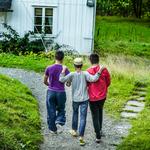How is the “Return Turn” experienced by refugee families in Denmark?
Denmark is among the countries which has taken a sharp turn in their immigration politics. Today all residence permits are given with a view to temporary residence in Denmark and not, as previously, with a view to permanent residence. Our PhD student Sarah-Louise J. Mortensen explores how Syrian and Somali refugee families experience and cope with “temporary residence” and “return” in their everyday life in Denmark.
For her Master’s thesis, Sarah-Louise J. Mortensen conducted fieldwork among Sudanese refugees in the makeshift camp “the Jungle” in Calais, France where she explored the refugees’ orientations, hopes and mobility during their temporary and precarious stay in the camp and throughout its demolition. She builds on these experiences for her PhD in the TemPro project.
-Tell us about the ‘paradigm shift’ in Denmark
The PhD project takes its point of departure in the Danish “Return Turn”. Since 2015, Danish governments have steadily introduced a turn in Danish asylum politics that emphasise temporary protection and return of refugees to their country of origin. With the introduction of the “Paradigm shift in Danish Immigration Politics” (2019), the character and duration of residence permits changed. Today all residence permits are given with a view to temporary residence in Denmark and not, as previously, with a view to permanent residence. Residence permits must be renewed every year or every second year depending on the refugee status, and extensions of residence permits are primarily based on a protection need and not on refugees’ attachment to Denmark (e.g. language skills and education). A quite literal change in the Integration Act was to remove the word “integration” from the Act and insert words like “self-support and home travel” instead. Amendments in the Repatriation Act has enabled refugees, who have resided in Denmark for a year or more, to apply for repatriation support to countries that are assessed “unsafe” by Danish Authorities.
Security assessments of South and Central Somalia (2015) and of Damascus in Syria (2019), have made especially Somali and Syrian refugees subject to examination and revocation of residence permits. My PhD project focusses in particular on these two nationalities.
-How will you explore this in your research?
Through ethnographic fieldwork, I seek to explore how Syrian and Somali refugee families experience and cope with “temporary residence” and “return” in their everyday life in Denmark. As such, the project attends to the experiences of the Return Turn across gender and generations. It explores the dynamics between the temporality of law and the multiple temporalities that family members may engage in. I also seek to unfold how the uncertain timeframe of temporary protection influence family members’ interrelations, as well as their social relations and orientations inside and outside Denmark. Furthermore, I am curious to explore how refugees negotiate their legal status with institutional practitioners (e.g. lawyers and social workers), and what happens to those who decide to leave Denmark.
-What are your goals with this project?
The PhD project contributes to the TemPro project by bringing evidence and awareness to the lived experiences of the Return Turn in Denmark from the perspective of Syrian and Somali refugees and the institutional practitioners they engage with. Furthermore, I aim to experiment with creative methods for data collection, and in collaboration with interlocutors, I hope to use the podcast format as a simultaneous method and communication tool. Last, but not least, I am very excited about the interdisciplinary collaboration in the TemPro project and I look forward to see what it will bring to my PhD project and to the overall project.
Sarah-Louise J. Mortensen holds a MA in Social Anthropology from Aarhus University. She has worked for two and a half years as a project manager at a Resource Centre for Integration in a Danish municipality. Her PhD project is enrolled at the Department of Anthropology, Aarhus University. It is funded by The Research Council of Norway and Aarhus University.
